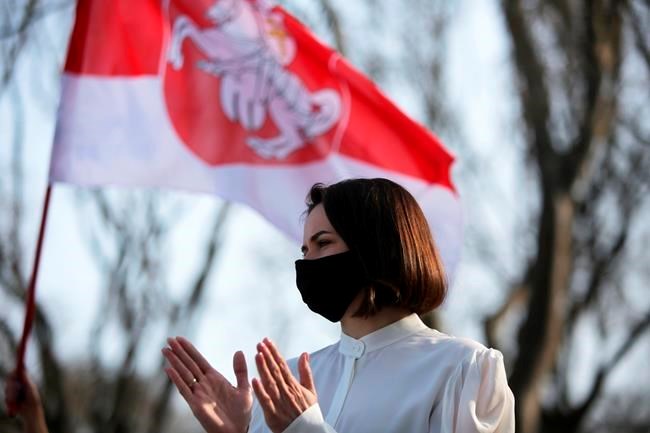OTTAWA — The exiled opposition leader of Belarus says she is an "accidental" revolutionary who threw herself into the dangerous political arena of her country only out of love for her people, husband and children.
Speaking to theology students in Halifax on Thursday, Sviatlana Tsikhanouskaya said she considered herself simply a stay-at-home mother and wife when her husband decided to run against Belarusian President Alexander Lukashenko.
After he was jailed for his political activism last year, Tsikhanouskaya said, she witnessed other citizens of her country being detained, tortured and raped for revolting against the authoritarian regime.
"When (my husband) was jailed because of his political position against the regime ... I wanted to show him we are family and I wanted to stand with him to the end."
After she submitted her candidacy papers to run in her husband's place, Lukashenko and his supporters likely jeered, so confident were they in their assumption the Belarusian people would never support a woman as a leader, Tsikhanouskaya said.
They were wrong.
"He didn't catch the mood of Belarusian people that we are ready for changes. We woke up after 26 years of the regime, we wanted to change something in our country."
Tsikhanouskaya shied away from suggestions she has been fearless or a hero in taking on the role of political agitator.
She woke every day in fear of threats she would be jailed and that her children would be taken away to an orphanage, which is why she fled to Lithuania after the August election that was denounced by Canada and its allies as fraudulent.
Tsikhanouskaya praised Francois-Philippe Champagne, Canadian foreign affairs minister at the time, for being the first international official to call her and offer support after her exile. She also thanked Canada for being among the first nations to condemn the violent clampdown on the pro-democracy movement that has taken root in Belarus.
Canada is among several nations, including the U.S. and members of the European Union, that have denounced the presidential election in Belarus as neither free nor fair, giving rise to sanctions against officials said to be responsible for vote-rigging and a subsequent crackdown on protests.
David Deane, an associate professor at the Atlantic School of Theology in Halifax, said his students were keen to learn how someone like Tsikhanouskaya developed the courage to take on a political regime that continues to threaten her and her family.
This is especially important at a time when new leadership approaches are being sought worldwide in the wake of the many social inequities laid bare by the COVID-19 pandemic, Deane said.
He noted Tsikhanouskaya's movement has remained committed to peaceful means of protest, and she has not called for retribution, only justice against officers who have tortured or beaten citizens.
Her combination of feminism and pacifism stands in stark contrast to paternalistic leadership often seen in eastern Europe, said Deane.
"That's why the movement became what it became. Where a woman was willing to run for office, without taking power, then everything we've ever known about how things work has been overthrown," he said.
"This is a country that's far less cynical because of Sviatlana and her movement. It's an exciting and thrilling thing."
Tsikhanouskaya urged Canadians and other international allies to speak out against the atrocities being perpetrated against her people in their fight for democracy.
Political prisoners in Belarus would appreciate letters of support from Canadians and other allies, she added.
"It's very important for Belarusian people in this difficult period of our lives, in this difficult period of fighting, that the world wouldn't forget about us."
If people tell parents, neighbours and friends about the country's plight, the "more powerful your help" will be, she said.
This report by The Canadian Press was first published March 18, 2021.
— With a file from Michael Tutton in Halifax
Teresa Wright, The Canadian Press



